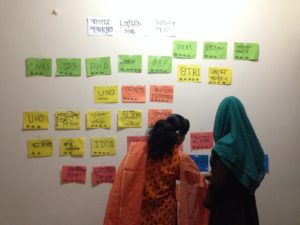
Earlier this year, Pure Earth Bangladesh and a local partner, We Are Friends For Human (WAFFH), hosted workshops on the harmful effects of pollution on human health. The workshops were primarily attended by tea estate workers, a marginalized, multi-ethnic group, whose health has been largely overlooked.
The workshops in Bangladesh are part of Pure Earth’s pilot global community outreach initiative, which works with local partners to identify and address environmental justice issues among women, youth, and other under-represented populations. In addition to Bangladesh, Pure Earth has also activated communities in Colombia and Senegal, with more to follow.
“We’re looking to engage communities by facilitating workshops where they have the opportunity to identify and design their own solutions to the pollution issues they face,” said Lara Crampe, Pure Earth’s Vice President of International Operations.

Bangladesh is one of the largest tea producers in the world, and the Moulvibazar District, where Kulaura is located, and where the first workshop was held, is home to the most tea plantations in the country. The second workshop was held online due to a COVID-19 country-wide lockdown. Despite challenges, WAFFH volunteers were able to provide access to community members without sufficient internet. In addition to tea workers, workshop participants included journalists, teachers, community health workers, and NGO workers.
“As a journalist, I must say that it is an unprecedented event for the ill-fated tea worker community. This event must uplift us. Our community lacks education and awareness. We want more events like this,” said Mintu Deshwara, a correspondent with the Daily Star, who attended one of the workshops.
Educating and Empowering Workers
Pesticide use in the tea gardens is a key issue, as it causes water pollution from run-off and air pollution from spraying. Pesticides have severe impacts on human health, and can contain toxic elements like cadmium, chromium, or lead.
“Tea garden workers are unaware of the need for protective safety measures or equipment when they use pesticides. Given that many workers are women and ethnic minorities, they are left in a very vulnerable condition. People must consider their access to information in responding to their environmental and health exposures,” said Amina Akbar, a lead project officer with Pure Earth Bangladesh.
Tea workers are some of the most underpaid workers in Bangladesh. Currently, their daily wage is about BDT 130 ($1.54 USD). In addition, tea workers, 75% of whom are women, are predominantly ethnic minorities such as Santal, Morong, and Unrao. Due to their low-income and marginalized ethnicities, they often suffer other poverty-related problems such as lack of access to health, nutrition, education, and shelter services.
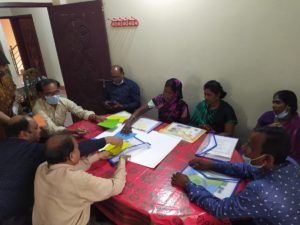
Each workshop began with a broad overview of the project and its goal of raising awareness about the adverse effects of pollution. Participants were then encouraged to share their personal thoughts and experiences relating to pollution.
“The workshops are focused on having people identify what pollution affects them and what the most appropriate actions are to protect their health and the health of their community,” said Crampe.
One government health official mentioned that several tea estate workers had visited him with problems relating to their skin, vision, and respiratory organs, which could be symptoms of exposures to chemicals.
As a result of the findings, Zion Rabbi Samadder, a project officer with Pure Earth Bangladesh, provided recommendations to mitigate these issues, which included the use of safety equipment such as gloves, masks, and boots while spraying pesticides.
At both workshops, participants were invited to work in groups to identify the potential challenges to addressing the pollution issues.
A major point of concern was a lack of awareness among the tea garden workers about the health impacts of pesticides being used. The absence of proper pesticide application guidelines and regulation enforcement in the gardens posed a significant challenge.
Many participants also shared that they use a traditional mud stove for cooking and wood as fuel, which causes indoor-air pollution from burning biomass in poorly ventilated spaces.
One labor leader shared that few tea garden workers wash their hands or take baths upon returning home. He recommended arranging more public awareness events with workers. If they knew about the consequences, he said, it would be easier to motivate them to change their practices regarding pesticides.
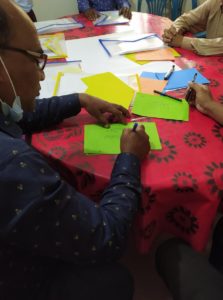
Working in teams, participants discussed potential outreach and involvement tools in order to mitigate and prevent exposure to pesticides and air pollutants.
They concluded that while government offices are the main sources of legal, administrative, and technical support, without proper mobilization of tea estate owners and workers, it would be hard to convince them to play an active role. For this reason, it was decided that negotiating and communicating with the owners of the tea estates was a pivotal next step to initiate change.
Dipthi Naidu, a tea estate worker, said, “We’ve learned many useful things here today. But our other sisters and brothers also need to know these to make their lives better.”
The meeting concluded with a plan for next steps, which included communicating with the management of one of the largest tea gardens, Longla tea estate, and obtaining their permission to run an awareness campaign surrounding pesticide use.
Facebook Campaign
To raise awareness, Pure Earth and WAFFH began a month-long social media campaign, where they invited young people and students to share personal testimonies on pollution in their community.
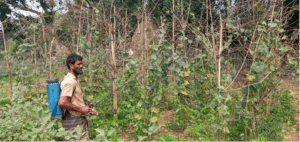
Young people submitted 132 photos, which were posted in a Facebook group entitled “চাই নির্মল ও সজীব চা বাগান (For pure and lively tea gardens)”. An upcoming public event at a local school will provide prizes for the top posts.
“Our goal is to create a vibrant and diverse online community that is conscious of and active against pollution, particularly among youth in Bangladesh,” said Akbar.
Pure Earth Bangladesh and WAFFH will continue hosting events in the region to increase public awareness about proper pesticide use and traditional cooking practices.
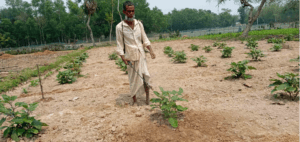
This post is from Pure Earth’s Communications Intern, Sarah Berg.





